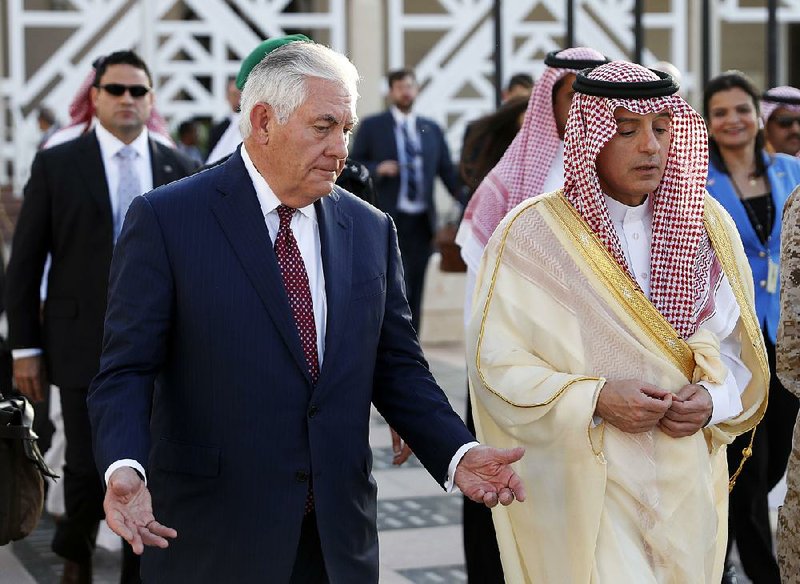DOHA, Qatar -- U.S. Secretary of State Rex Tillerson on Sunday pressed Saudi Arabia and Iraq to help isolate and contain Iran in the Middle East and beyond.
He also called for a quick resolution to the ongoing crisis between Qatar and its Arab neighbors, which he said was unintentionally bolstering Iran.
In Saudi Arabia and later Qatar, Tillerson denounced Iran's "malign behavior" and urged nations of the region and elsewhere, notably Europe, to join the administration to halt any business they do with Iran's powerful Revolutionary Guard or face "great risk" of U.S. sanctions.
He also demanded that Iranians in Iraq either return to their homes, integrate into the Iraqi army or leave the country. Shiite militias mostly composed of Iraqi citizens, but backed by Iran, were instrumental in helping the Iraqi army drive the Islamic State extremist group from Mosul and other strongholds. There have been reports of Iranian advisers among them. Tillerson said they have no business being in Iraq now that the Islamic State has been routed.
"Those fighters need to go home," Tillerson said. "Any foreign fighters need to go home."
Tillerson was in Riyadh for the inaugural meeting of the Saudi Arabia-Iraq Coordination Council, where Tillerson told Saudi King Salman and Iraqi Prime Minister Haider al-Abadi that the nascent partnership between their countries held great promise for Iraq's reconstruction after devastating battles to wrest territory from the Islamic State.
"We believe this will in some ways counter some of the unproductive influences of Iran inside of Iraq," he said at a news conference with Saudi Foreign Minister Adel al-Jubeir after the council meeting.
Tillerson said countries outside of the region could also play a role, primarily by shunning the Revolutionary Guard, which plays a major role in Iran's economy and was added to a U.S. terrorism blacklist earlier this month.
"We are hoping that European companies, countries and others around the world will join the U.S. as we put in place a sanctions structure to prohibit certain activities of the Iranian Revolutionary Guard that foment instability in the region and create destruction in the region," Tillerson said.
The threat of more sanctions is one of the most potent weapons against Iran and the 2015 nuclear deal. The potential for Iran to rejoin the world economy and improve its fortunes was the main reason Iran agreed to limit its nuclear program in the landmark agreement with six world powers, including the United States. But President Donald Trump's administration is taking a more aggressive stance toward a country it considers a malign actor in the region, largely because of actions not addressed in the nuclear deal.
At the council meeting, Tillerson praised the Saudi king and al-Abadi for the August reopening of a major border crossing and this month's resumption of direct flights between Riyadh and Baghdad.
"Both represent the beginning of what we hope will be a series of even more tangible actions to improve relations and strengthen cooperation on a host of issues," he said. "Your growing relationship between the kingdom and Iraq is vital to bolstering our collective security and prosperity, and we take great interest in it."
U.S. officials believe the council can wean Iraq from Iran, its neighbor to the east, in favor of Saudi Arabia, its neighbor to the south. Iran, a majority-Shiite nation, has sought better relations with majority-Shiite Iraq since the fall of Saddam Hussein's Sunni-dominated regime. Saudi Arabia is led by Sunnis, and Shiites are a minority there.
History, religion and lots of politics stand in Tillerson's way, but both the Saudi king and the Iraqi prime minister appeared optimistic about the prospects for better relations.
"We are facing in our region serious challenges in the form of extremism, terrorism as well as attempts to destabilize our countries," Salman said. "These attempts require our full attention. ... We reaffirm our support for the unity and stability of our brother country of Iraq."
Al-Abadi expressed pleasure with "the thriving relations between our two brotherly countries."
"We are open and we want to move away from the past," he said. "The region cannot tolerate any further divisions."
After his talks in Riyadh, Tillerson flew to the Qatari capital of Doha, a direct route that has been closed to commercial airlines since June when the now-five-month-old crisis began between Qatar and four nations -- Saudi Arabia, Bahrain, Egypt and the United Arab Emirates. The four nations accuse Qatar of financing terrorism.
Tillerson came to the region in June in an unsuccessful attempt to facilitate talks. Qatar is home to the largest U.S. military base in the Middle East, with 11,000 troops stationed there.
"The United States remains concerned that the dispute has had negative consequences economically and militarily; the U.S. has felt these effects as well," Tillerson said. "None of us can afford to let this dispute linger. We ask that everyone ease the rhetoric and de-escalate the tensions."
Last month, after publicly showing sympathy for Saudi Arabia's stance, Trump offered to mediate the dispute, predicting "you'd have a deal worked out very quickly."
Tillerson renewed those calls for talks, but admitted that progress seemed unlikely. "We cannot force talks between parties who are not ready to talk," he said.
He noted that the only country benefiting from the crisis is Iran, which is now Qatar's lifeline as its neighbors have sealed their land, sea and air borders. He said Qatar's new reliance on Iranian airspace is "the most immediate and obvious gain that Iran has."
"Anytime there is conflict and destabilization among countries that are typically allies, someone will always come in to exploit those differences," Tillerson added.
Information for this article was contributed by Matthew Lee and Aya Batrawy of The Associated Press; and by Carol Morello of The Washington Post.
A Section on 10/23/2017
